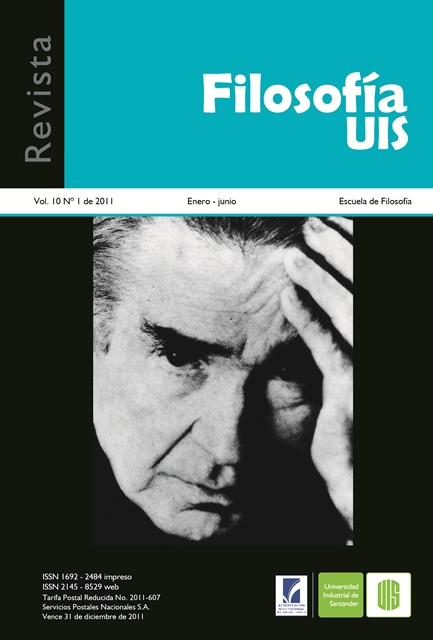Published 2011-07-15
Keywords
- humanism,
- metaphysics,
- anthropology,
- truth,
- post-humanism
How to Cite
Copyright (c) 2011 Adriana Patricia Carreño

This work is licensed under a Creative Commons Attribution 4.0 International License.
Abstract
This article intends to resume the question of Jean Beaufret to Martin Heidegger in a letter written in 1946. The Enlightenment project has failed, among the process of drafting of human rights, with a Europe in ruins and at the sight human calamity, under the most sophisticated service of destruction and mass annihilations. For Heidegger, to resume the discussion of humanism in the traditional Western way of thinking is in this sense, losing the guidance, losing the sense. Heidegger points out the reason: the dependence between the concept of humanism and metaphysics. The concept man, the foundation of modern metaphysics and its political projects is empty. The question, what is humanism? Is the vox clamantis in deserto that opens the consciousness of the crisis of humanism and general culture. The extension of this negative moment is seen by Heidegger in anthropology, which it seen as another form of humanism that is a sinister talking bivalent language of metaphysics.
Downloads
References
- Duque, Félix (2002). En torno al humanismo. Heidegger, Gadamer, Sloterdijk, Madrid: Tecnos.
- Duque, Félix (2007). “Hegel. Alabanza del saber, menosprecio del individuo”, En: Revista Filosofía UIS. Vol. 6 N° 1 y 2. Bucaramanga. Universidad Industrial de Santander.
- Duque, Félix (2005). Temas de filosofía hermenéutica, Bogotá: Universidad de Los Andes.
- Farias, Victor (1987). Heidegger y el nazismo, Santiago de Chile: Fondo de Cultura Económica.
- Gutiérrez, Carlos (2008). “La interpretación heideggeriana del actuar humano”, En: “¿Quiénes somos? Hacia una comprensión de lo humano, Chía: Universidad de La Sabana.
- Heidegger, Martin (1953). Doctrina de la verdad según Platón y Carta sobre el Humanismo. Traducción por Luis David García Bacca y Alberto Wagner de Reyna. Prólogo de Ernesto Grassi, Santiago de Chile: Universidad de Chile.
- Heidegger, Martin (1990). Identidad y diferencia, Barcelona: Anthropos.
- Heidegger, Martin (1991). La proposición del fundamento, Barcelona: Ediciones del Serbal.
- Heidegger, Martin (1994). Gesamtausgabe III Abteilung: Unveröffentlichte Abhandlungen. Vorträge – Gedachtes. Band 65. Beiträge zur Philosophie (Vom Ereignis) (1936/1938), ed. F.-W. von Herrmann.
- Heidegger, Martin (1994). “Superación de la metafísica” y “la cosa”, En: Conferencias y artículos, Barcelona: Ediciones del Serbal.
- Heidegger, Martin (1997). Gesamtausgabe III Abteilung: Unveröffentlichte Abhandlungen. Band 66 Besinnung. (1938/39). Frankfurt Am Main: Vittorio Klostermann. ed. F.W. von Herrmann.
- Heidegger, Martin (1997). Introducción a la metafísica, Barcelona: Gedisa.
- Heidegger, Martin (1999). Ontología: Hermenéutica de la facticidad, Madrid: Alianza editorial.
- Heidegger, Martin (2001). ¿Qué es Metafísica?, En: Hitos. Versión de Helena Cortés y Arturo Leyte, Madrid: Alianza.
- Heidegger, Martin (2003). Ser y Tiempo, Madrid: Trotta.
- Heidegger, Martin (2005) ¿Qué significa Pensar?, Madrid: Trotta.
- Nietzsche, Friedrich (1989). La ciencia jovial. La Gaya Scienza. Traducción por José Jara, Caracas: Monte Avila.
- Nietzsche, Friedrich (1989). La ciencia jovial. La Gaya Scienza, En: http://www.nietzscheana.com.ar/textos/de_la_gaya_scienza.htm (visitado el 10 de noviembre de 2010).
- Nietzsche, Friedrich (2001). Más allá del bien y del mal. Traducción por Andrés Sánchez Pascual, Madrid: Alianza.
- Platón (1982-1999). “República”, En: Diálogos IV. Traducción Emilio Lledó Iñigo, Madrid: Editorial Gredos.
- Platón (1999). Menón, Madrid: Planeta Deagostini.
- Slöterdijk, Peter (2006). Normas para el parque humano: una respuesta a la carta sobre el humanismo de Heidegger, Madrid: Siruela.
- Tugendhat, Ernst (2007). Antropología en vez de metafísica, Barcelona: Gedisa.
- Volpi, Franco (2007). “La maravilla de las maravillas: que el ente es. Wittgenstein, Heidegger y la superación “ético-práctica” de la metafísica”, En: Cardona, Luis Fernando (compilador). Heidegger: El testimonio del pensar, Bogotá: Pontificia Universidad Javeriana.
